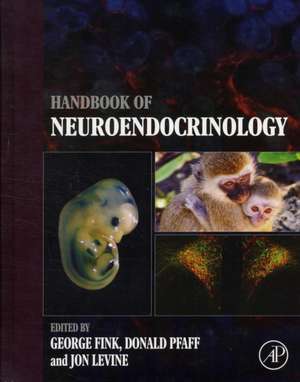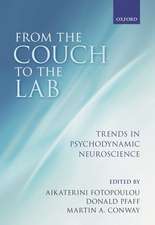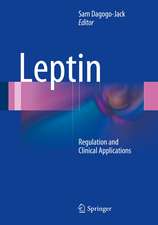Handbook of Neuroendocrinology
Editat de George Fink, Donald W. Pfaff, Jon Levineen Limba Engleză Hardback – 26 oct 2011
- The most comprehensive up-to-date source covering basic principles, neural regulation, hormone/brain function and behavior, and neuroendocrine pathology
- "How do we know?" callout sections highlight core concepts
- Heavily illustrated with over 350 figures, 4-color throughout
Preț: 806.27 lei
Preț vechi: 930.66 lei
-13% Nou
154.29€ • 160.11$ • 128.97£
Carte tipărită la comandă
Livrare economică 08-22 martie
Specificații
ISBN-10: 0123750970
Pagini: 894
Ilustrații: Illustrations (some col.)
Dimensiuni: 216 x 276 x 46 mm
Greutate: 2.86 kg
Editura: Elsevier LTD, Oxford
Public țintă
Researchers and clinicians in the fields of neuroendocrinology and behavior; graduate students in neuroscience and related disciplines (psychiatry, neuropharmacology, medicine & veterinary medicine); medical residentsCuprins
Part I: Basic Principles of Neuroendocrinology An introduction to neuroendocrine systems Signaling in neuroendocrine systems Neuroendocrine Control Systems
Part II: Neural Regulation of Endocrine Systems Evolution of Neurohormones Neural control of the anterior lobe of the pituitary gland (pars distalis) Neural control of the posterior pituitary gland (neurohypophysis) Neural Control of the Intermediate Lobe of the Pituitary Gland (Pars Intermedia) and Proopiomelanocortin THE HYPOTHALAMIC PITUITARY ADRENAL AXIS AND NEUROENDOCRINE RESPONSES TO STRESS Neuroendocrine Control of Reproduction Lifetime Regulation of Growth-Hormone (GH) Secretion NEUROENDOCRINE REGULATION OF DEVELOPMENT, GROWTH AND METABOLISM - THYROID Circadian Rhythms in Neuroendocrine Systems Cardiovascular control - renin angiotensin- AV3V - PVN
Part III: Hormones, Brain Function and Behavior Neuroendocrine Regulation of Food Intake and Energy Homeostasis Neuropeptide regulation of stress-induced behavior: insights from the CRF/Urocortin family Neuroendocrine regulation of body water and electrolytes: Thirst and salt appetite Sexual differentiation of brain and behavior Corticosteroid actions on neurotransmission Neuroendocrine Mechanism of Puberty Sexual behaviors Stress and brain function Neuroendocrinology of Aggression Chronic Social Stress: Effects on Neuroendocrine Function Estrogen and Cognitive Aging in Women: The Critical Period Hypothesis Hormones, mood and affect Hormones and the aging brain
Part IV: Neuroendocrine Pathology KALLMANN SYNDROME AND OTHER CAUSES OF HYPOTHALAMIC HYPOGONADISM AND RELATED DEVELOPMENT DISORDERS Parental Behavior and the Perinatal Programming of Infant Development Disorders of the hypothalamic-pituitary- adrenocortical system Disorders of the Hypothalamic-Pituitary-Gonadal Axis Disorders of the hypothalamic-pituitary- thyroid system Neuroendocrine growth disorders - dwarfism - gigantism Neuroendocrine inherited or induced aromatase enzyme deficits Pituitary adenomas Neuroendocrine carcinomas Psychoneuroendocrinology
Descriere
Neuroendocrinology, the discipline concerned with how the nervous system controls hormonal secretion and how hormones control the brain, is pivotal to physiology and medicine. Neuroendocrinology has disclosed and underpins fundamental physiological, molecular biological and genetic principles such as the regulation of gene transcription and translation, the mechanisms of chemical neurotransmission and intracellular and systemic feedback control systems. Reproduction, growth, stress, aggression, metabolism, birth, feeding and drinking and blood pressure are some of the bodily functions that are triggered and/or controlled by neuroendocrine systems. In turn, neuroendocrine dysfunction due to genetic or other deficits can lead, for example, to infertility, impotence, precocious or delayed puberty, defective or excessive growth, obesity and anorexia, Cushing’s Syndrome, hypertension or thyroid disorders. These as well as neuroendocrine tumors are some of the themes covered in the 36 chapters of the Handbook. Drafted by internationally acknowledged experts in the field, the Handbook chapters feature detailed up-to-date bibliographies as well as "how do we know?" call out sections that highlight the experimental or technical foundations for major concepts, principles, or methodological advances in each area. Aimed at senior undergraduate and graduate students, post-doctoral fellows and faculty in neuroscience, medicine, endocrinology, psychiatry, psychology and cognate disciplines, the Handbook of Neuroendocrinology satisfies an unmet need that will prove useful at the laboratory bench as well as in the office.
- The most comprehensive up-to-date source covering basic principles, neural regulation, hormone/brain function and behavior, and neuroendocrine pathology
- "How do we know?" callout sections highlight core concepts
- Heavily illustrated with over 350 figures, 4-color throughout













